Tutorial - UICollectionView inside TableViewCell
Dec 31, 2018
And here we are, last hours of 2018 and I'm writing the last post of the year, hope you like it.
Throughout this tutorial I'll try to explain how to insert an UICollectionView in a TableViewCell. Each TableViewCell will have the name of the band and a CollectionView with the members of the band. I am assuming that you have read this post. Here is the result

Create the project
- Open Xcode and create a Single View App.
- First of all we are going to create our model (we have created createModel() function to populate data).
struct Band {
var name: String
var image: UIImageView
var members: [String]
}
- Open Main.storyboard file
- Drag and drop an UITableView
- Drag and drop an UITableViewCell
- Select the Main.storyboard file and press Show assistant editor button.
- Create the tableView IBOutlet in your ViewController
Create XIB file
- Create a new User interface file. File-> New File and name it BandCell.

- Drop an UITableViewCell
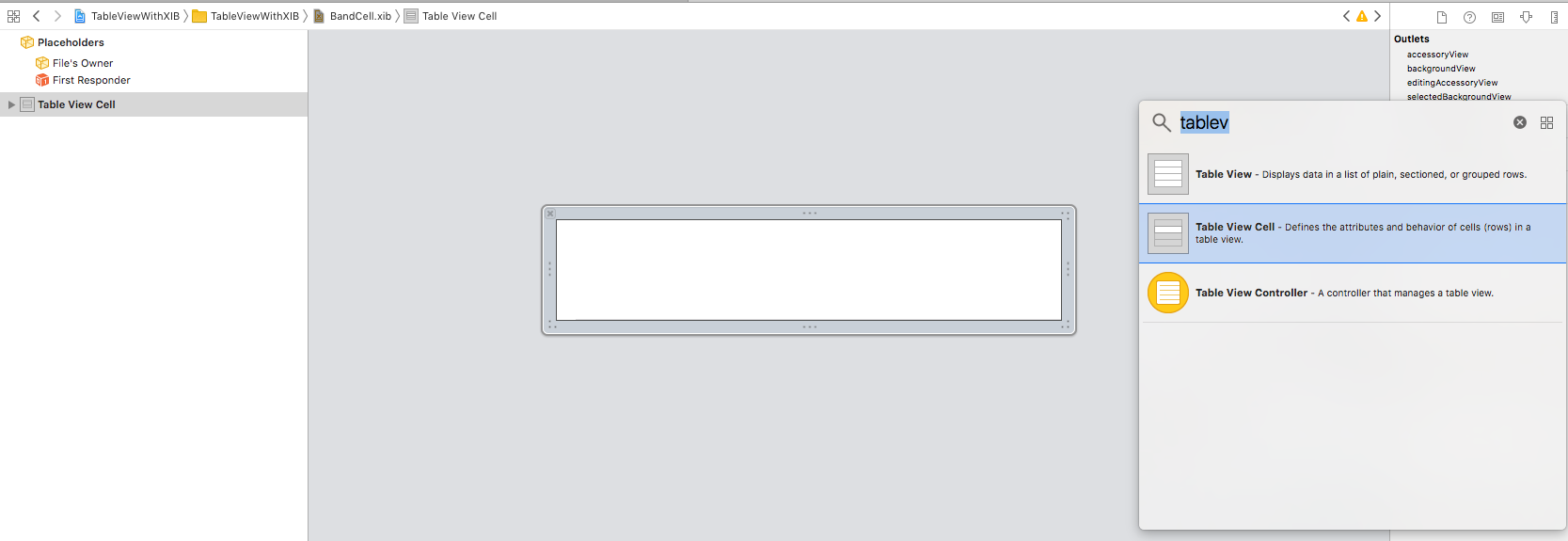
- Insert a UILabel (rock band name) and a UICollectionView (for members of the band) at the right of the UILabel
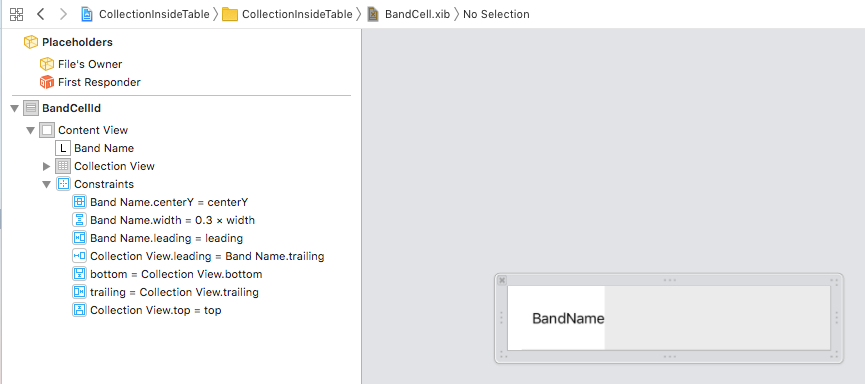
Create the BandCell class
- Create a new Cocoa Touch class and name it BandCell
- In the BandCell.xib file
- open the Identity Inspector tab and in custom class type BandCell.
- open the Attribute inspector tab and in Identifier type BandCellId
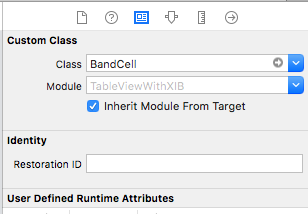
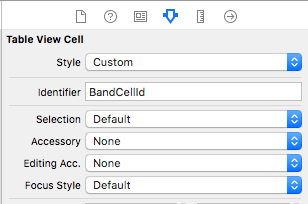
- Create IBOutlets in BandCell class for UILabel and UICollectionView
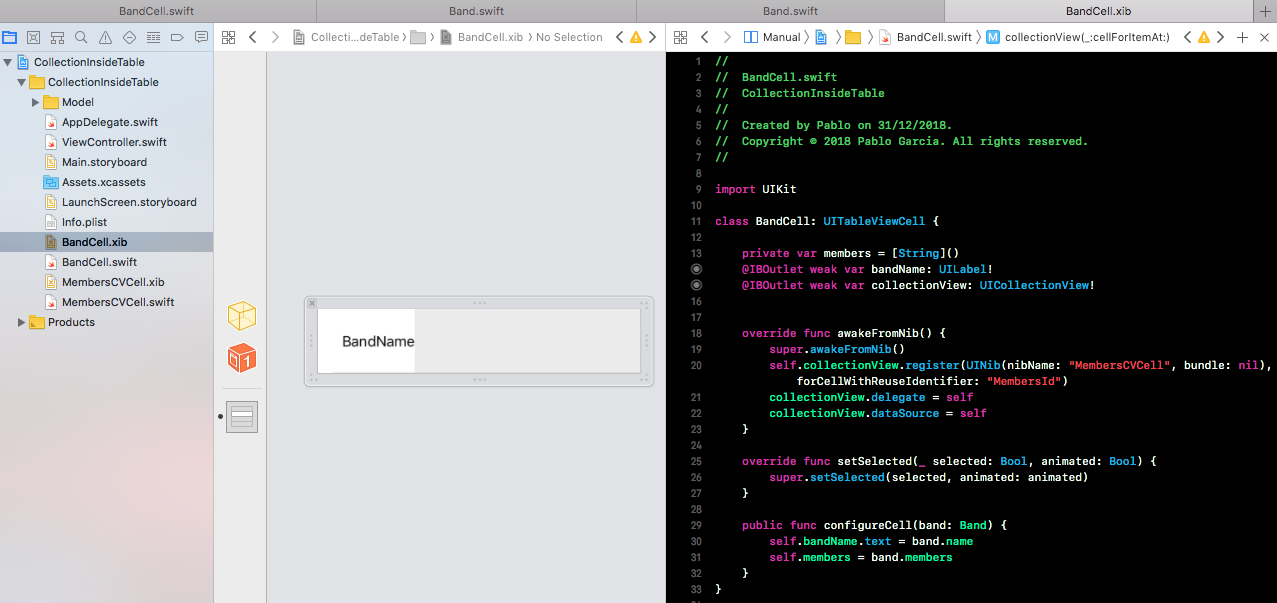
@IBOutlet weak var bandName: UILabel!
@IBOutlet weak var collectionView: UICollectionView!
```
- Add a function to configure the data
swift public func configureCell(band: Band) { self.bandName.text = band.name self.members = band.members }
### Configure tableView, and tableview's delegate and datasource
- Register the BandCell nib and create UITableViewDataSource functions
swift override func viewDidLoad() { super.viewDidLoad() tableView.delegate = self tableView.dataSource = self tableView.register(UINib.init(nibName: "BandCell", bundle: nil), forCellReuseIdentifier: "BandCellId") tableView.tableFooterView = UIView() }
swift extension ViewController: UITableViewDataSource { func tableView(_ tableView: UITableView, numberOfRowsInSection section: Int) -> Int { return model.count }
func tableView(_ tableView: UITableView, cellForRowAt indexPath: IndexPath) -> UITableViewCell {
let cell = tableView.dequeueReusableCell(withIdentifier: "BandCellId") as! BandCell
cell.configureCell(band: model[indexPath.row])
return cell } }
### Configure collectionView, and collectionView's datasource
Now it's time for our collectionView. In our BandCell class we have an UICollectionView and we have to do the same process as we did with our tableView. We are going to create a MembersCVCell.swift and a MembersCVCell.xib.
- MembersCVCell.xib will have a UILabel
- MembersCVCell.swift will extend UICollectionViewCell and an IBOutlet, just like this
swift class MembersCVCell: UICollectionViewCell {
@IBOutlet weak var bandMember: UILabel!
func configureCell(bandMember: String) { self.bandMember.text = bandMember }
}
- In BandCell.swift we have to setup the collectionView and UICollectionViewDataSource functions
swift override func awakeFromNib() { super.awakeFromNib() self.collectionView.register(UINib(nibName: "MembersCVCell", bundle: nil), forCellWithReuseIdentifier: "MembersId") collectionView.delegate = self collectionView.dataSource = self }
swift extension BandCell: UICollectionViewDelegate, UICollectionViewDataSource { func collectionView(_ collectionView: UICollectionView, numberOfItemsInSection section: Int) -> Int { return members.count }
func collectionView(_ collectionView: UICollectionView, cellForItemAt indexPath: IndexPath) -> UICollectionViewCell { let cell = collectionView.dequeueReusableCell(withReuseIdentifier: "MembersId", for: indexPath) as! MembersCVCell
cell.configureCell(bandMember: members[indexPath.row])
return cell }
}
And thats all. Pretty easy, isn't it? here is the [code](/images/posts/collectiontableview/CollectionInsideTable.zip)
### Merry Christmas and Happy New Year